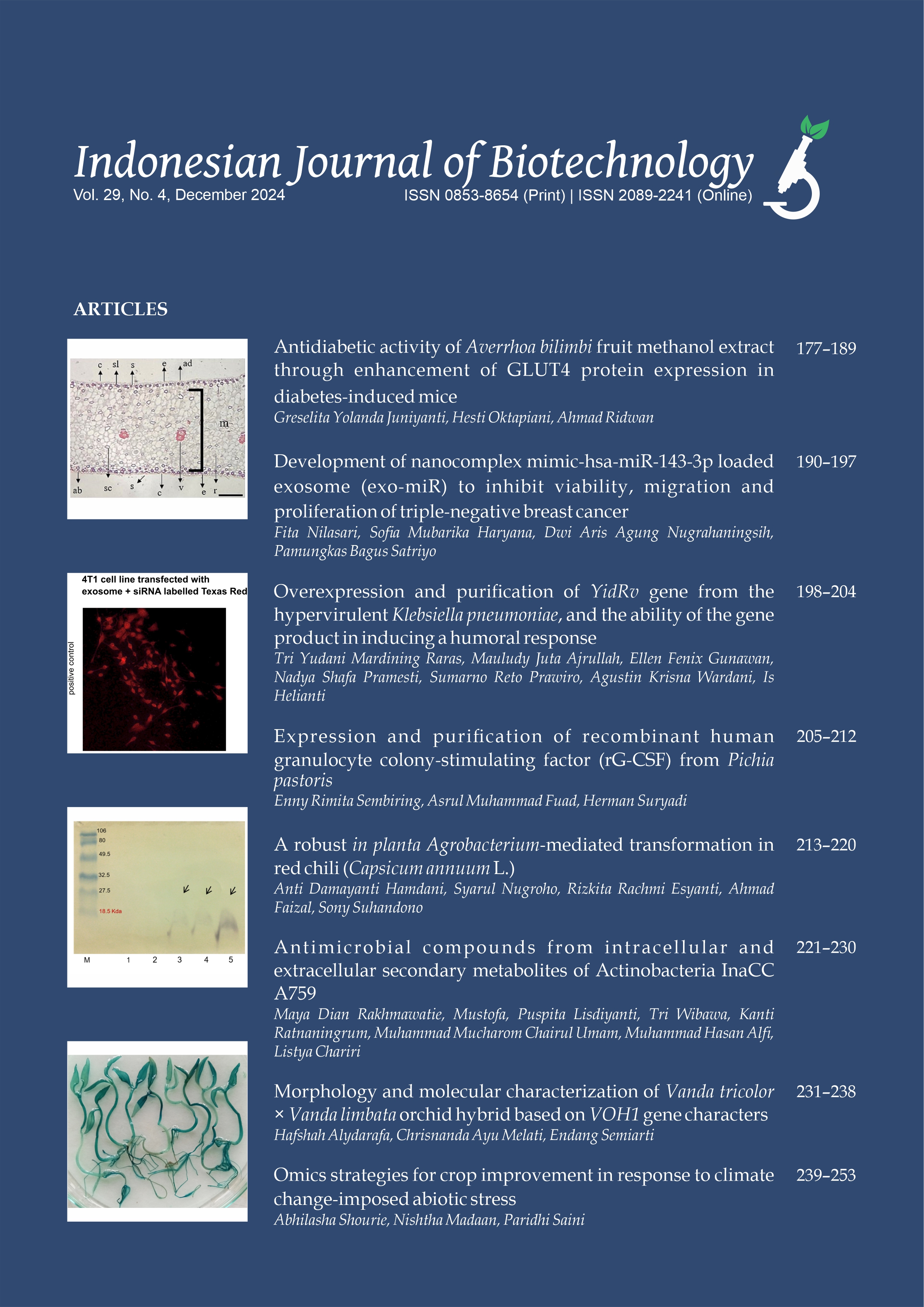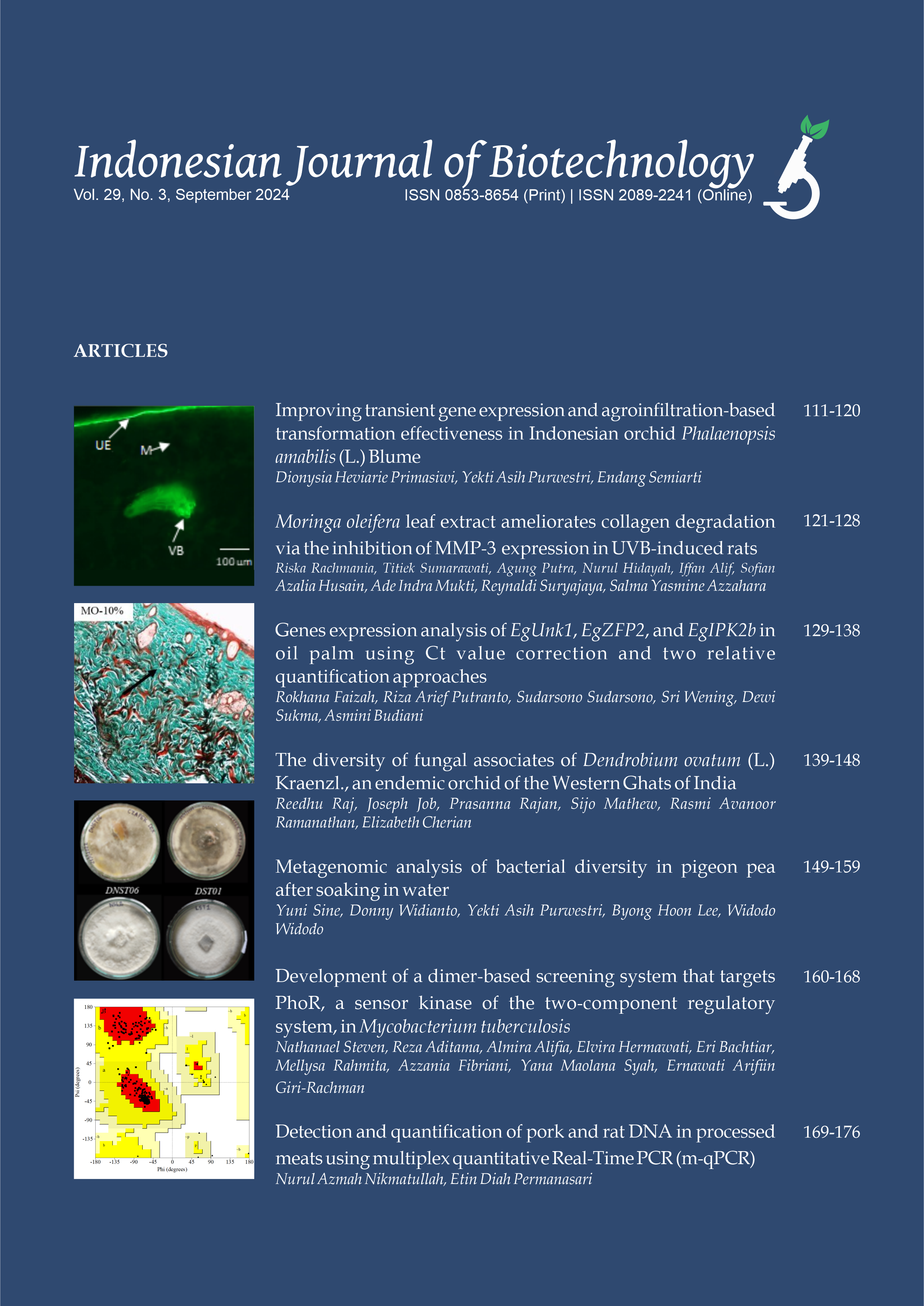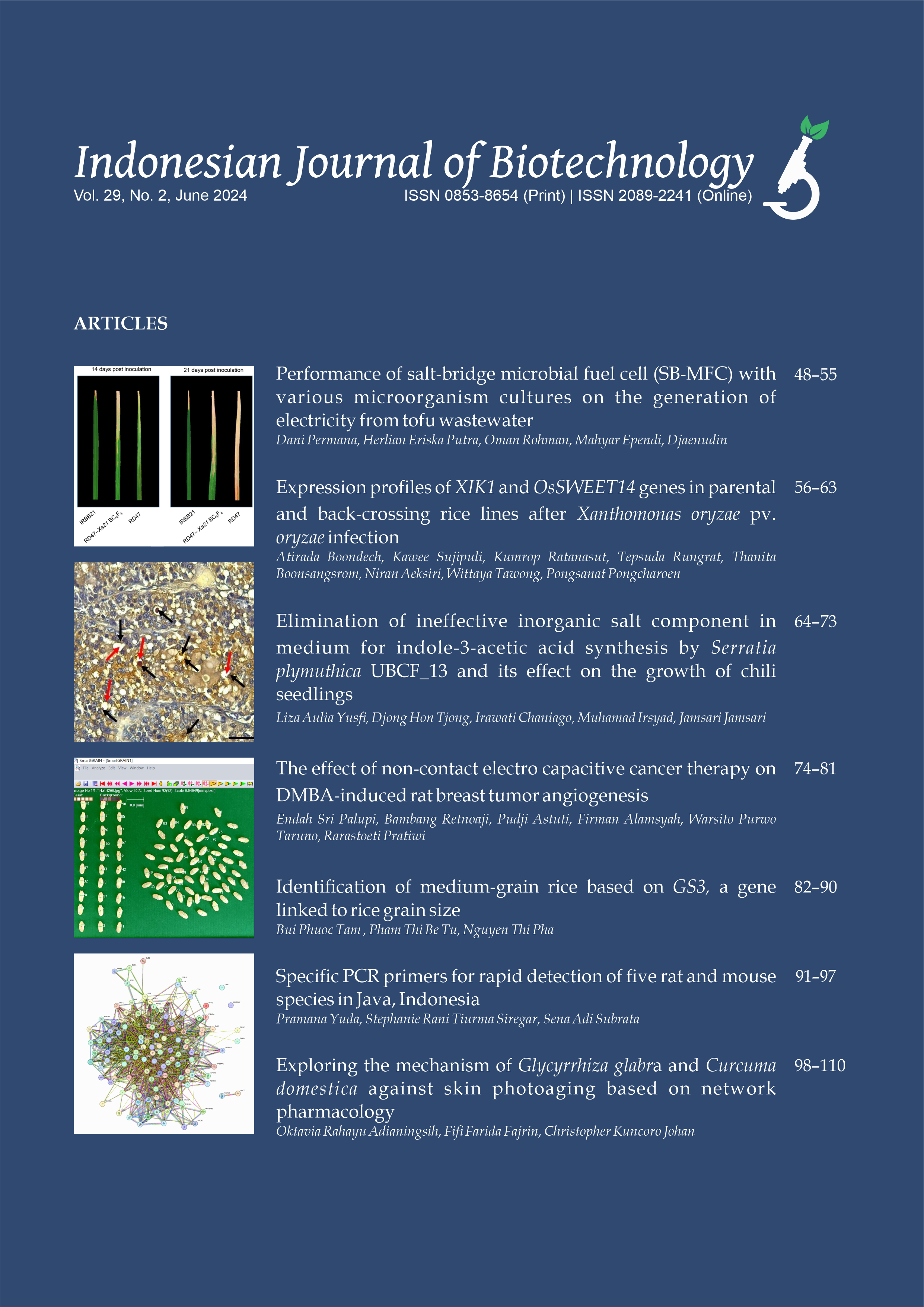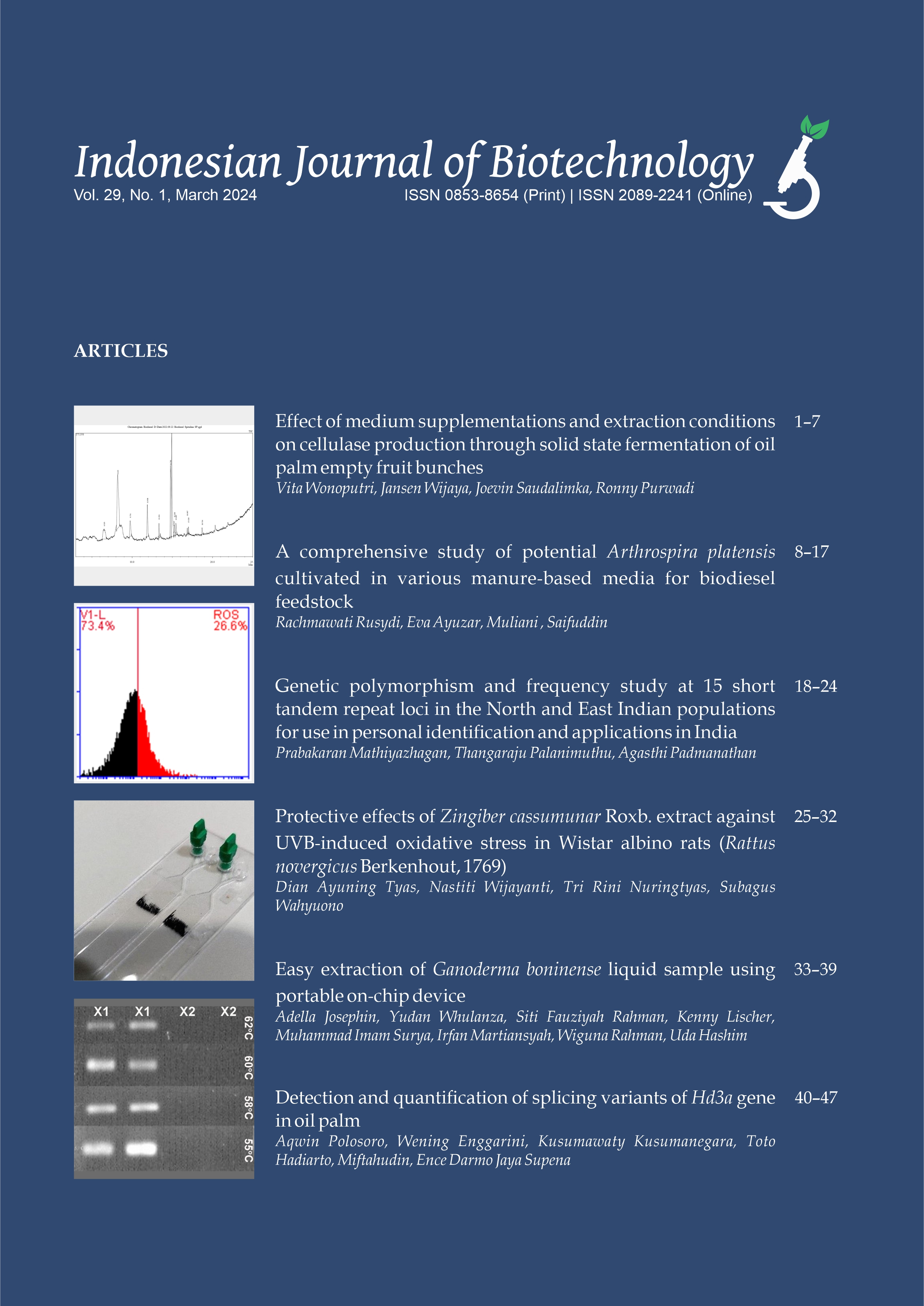- Focus and Scope
- Section Policies
- Peer Review Process
- Publication Frequency
- Open Access Policy
- Archiving
- Screening for Plagiarism
- Publication Ethics and Malpractice Statement
- Reviewer Guidelines
Focus and Scope
IJBiotech is an open access, peer-reviewed, multidisciplinary journal dedicated to the publication of novel research in all aspects of biotechnology, with particular attention paid to the exploration and development of natural products derived from tropical—and especially Indonesian—biodiversity. Original research articles and Review articles written in English and featuring well-designed studies with clearly analyzed and logically interpreted results are accepted, with a strong preference given to research that has the potential to make significant contributions to both the field of biotechnology and society in general.
In keeping with the multidisciplinary nature of biotechnology, IJBiotech does not accept manuscripts written by a single author. Papers whose research focuses on method optimization or confirmation, or is a repetition of a previously conducted study but using a different organism will also not be considered, as these are outside of the journal's scope.
Topics include:
Section Policies
Articles
Peer Review Process
All manuscripts submitted to IJBiotech undergo a rigorous screening and review process to ensure that they fit into the journal's scope and are of sufficient academic quality and novelty to appeal to IJBiotech's readership. IJBiotech employs a double-blind peer review, in which both author(s) and reviewers identities are concealed from each other.
Initial screening. A newly submitted manuscript will be screened by the Editor-in-Chief for its conformity to IJBiotech’s scope and basic submission requirements.
Peer-review. If the manuscript passes the initial screening stage, it will be assigned to a handling editor, who will then send it to at least two experts in the relevant field to undergo a double-blind peer-review. Manuscripts that fail to pass the initial screening will be rejected without further review.
First decision. A decision on a peer-reviewed manuscript will only be made upon the receipt of at least two review reports. In cases where reports differ significantly, the handling editor will invite an additional reviewer to get a third opinion before making a decision. At this stage, a manuscript can either be rejected, asked for revisions (minor or major), accepted as is, or (if significant changes to the language or content are required) recommended for resubmission for a second review process. If it is accepted, the manuscript will be returned to the submitting author for formatting. The final decision to accept the manuscript will be made by the Editor-in-Chief based on the recommendation of the handling editor and following approval by the board of editors.
Revision stage. A manuscript that requires revisions will be returned to the submitting author, who will have up to three weeks to format and revise the manuscript, following which it will be reviewed by the handling editor. The handling editor will determine whether the changes are adequate and appropriate, as well as whether the author(s) sufficiently responded to the reviewers' comments and suggestions. If the revisions are deemed to be inadequate, this cycle will be repeated (the manuscript will be returned to the submitting author once more for further revision).
Final decision. At this stage, the revised manuscript will either be accepted or rejected. This decision is dependent whether the handling editor finds the manuscript to have been improved to a level worthy of publication. If the author(s) are unable to make the required changes or have done so to a degree below IJBiotech's standards, the manuscript will be rejected.
Publication Frequency
IJBiotech is published four times a year in March, June, September, and December through the Open Journal Systems platform.
Open Access Policy
- IJBiotech provides immediate open access to its published articles, with authors retaining copyright and free to deposit their work in any repository at any time.
- Articles are published under a Creative Commons Attribution-ShareAlike 4.0 International license. In addition to being freely accessible, they may be copied, shared, or adapted for any purpose in any medium, as long as appropriate credit is given to the author and IJBiotech and changes are indicated.
Archiving
This journal utilizes the PKP-PN LOCKSS system to create a distributed archiving system among participating libraries and permits those libraries to create permanent archives of the journal for purposes of preservation and restoration.
Screening for Plagiarism
Manuscripts submitted to IJBiotech will be automatically screened for plagiarism using Turnitin. Papers found to contain a significant amount of plagiarism (including self-plagiarism) will be automatically rejected.
Publication Ethics and Malpractice Statement
IJBIOTECH is the one of Indonesia’s leading partner for research societies. We recognize and committed to promoting ethical publication practices across IJBIOTECH. Scientific information publishing depends greatly on trust. Editors trust peer reviewers for there confidentiality and effective assessments, authors trust editors for selection of peers, and readers trust in the peer-review process. Appropriate decisions and strong editorial processes will boost an efficient publishing system; this will benefit scientific societies, editors, authors, research scholars, research sponsors, readers, and publishers.
Duties of Authors
Reporting standards
Authors of article should present an accurate data of the work as well as an objective discussion of its significance. Underlying data should be represented accurately in the paper. A paper should contain sufficient detail and references to permit others to replicate the work. Fraudulent or knowingly inaccurate statements constitute unethical behavior and are unacceptable. Review and professional publication articles should also be accurate and objective, and editorial ‘opinion’ works should be clearly identified as such.
Data access and retention
Authors may be asked to provide the raw data in connection with a paper for editorial review, and should be prepared to provide public access to such data (consistent with the ALPSP-STM Statement on Data and Databases), if practicable, and should in any event be prepared to retain such data for a reasonable time after publication.
Originality and plagiarism
The authors should ensure that they have written entirely original works, and if the authors have used the work and/or words of others that this has been appropriately cited or quoted. Plagiarism takes many forms, from ‘passing off’ another’s paper as the author’s own paper, to copying or paraphrasing substantial parts of another’s paper (without attribution), to claiming results from research conducted by others. Plagiarism in all its forms constitutes unethical publishing behavior and is unacceptable.
Multiple, redundant or concurrent publication
An author should not in general publish manuscripts describing essentially the same research in more than one journal or primary publication. Submitting the same manuscript to more than one journal concurrently constitutes unethical publishing behavior and is unacceptable. In general, an author should not submit for consideration in another journal a previously published paper. Publication of some kinds of articles (e.g. clinical guidelines, translations) in more than one journal is sometimes justifiable, provided certain conditions are met. The authors and editors of the journals concerned must agree to the secondary publication, which must reflect the same data and interpretation of the primary document. The primary reference must be cited in the secondary publication.
Acknowledgement of sources
Proper acknowledgment of the work of others must always be given. Authors should cite publications that have been influential in determining the nature of the reported work. Information obtained privately, as in conversation, correspondence, or discussion with third parties, must not be used or reported without explicit, written permission from the source. Information obtained in the course of confidential services, such as refereeing manuscripts or grant applications, must not be used without the explicit written permission of the author of the work involved in these services.
Authorship of the paper
Authorship should be limited to those who have made a significant contribution to the conception, design, execution, or interpretation of the reported study. All those who have made significant contributions should be listed as co-authors. Where there are others who have participated in certain substantive aspects of the research project, they should be acknowledged or listed as contributors. The corresponding author should ensure that all appropriate co-authors and no inappropriate co-authors are included on the paper, and that all co-authors have seen and approved the final version of the paper and have agreed to its submission for publication.
Hazards and human or animal subjects
If the work involves chemicals, procedures or equipment that have any unusual hazards inherent in their use, the author must clearly identify these in the manuscript. If the work involves the use of animal or human subjects, the author should ensure that the manuscript contains a statement that all procedures were performed in compliance with relevant laws and institutional guidelines and that the appropriate institutional committee(s) has approved them. Authors should include a statement in the manuscript that informed consent was obtained for experimentation with human subjects. The privacy rights of human subjects must always be observed.
Disclosure and conflicts of interest
All authors should disclose in their manuscript any financial or other substantive conflict of interest that might be construed to influence the results or interpretation of their manuscript. All sources of financial support for the project should be disclosed. Examples of potential conflicts of interest which should be disclosed include employment, consultancies, stock ownership, honoraria, paid expert testimony, patent applications/registrations, and grants or other funding. Potential conflicts of interest should be disclosed at the earliest stage possible.
Fundamental errors in published works
When an author discovers a significant error or inaccuracy in his/her own published work, it is the author’s obligation to promptly notify the journal editor or publisher and cooperate with the editor to retract or correct the paper. If the editor or the publisher learns from a third party that a published work contains a significant error, it is the obligation of the author to promptly retract or correct the paper or provide evidence to the editor of the correctness of the original paper.
Duties of editors
The research editor is responsible for deciding which of the articles submitted to the journal should be published. The editor may be guided by the policies of the journal's editorial board and constrained by such legal requirements as shall then be in force regarding libel, copyright infringement and plagiarism. The editor may confer with other editors or reviewers in making this decision. The research editor evaluates manuscripts for their intellectual content without regard to race, gender, sexual orientation, religious belief, ethnic origin, citizenship, or political philosophy of the authors.
The editor and any editorial staff must not disclose any information about a submitted manuscript to anyone other than the corresponding author, reviewers, potential reviewers, other editorial advisers, and the publisher, as appropriate. Unpublished materials disclosed in a submitted manuscript must not be used in an editor's own research without the express written consent of the author. Privileged information or ideas obtained through peer review must be kept confidential and not used for personal advantage.
Duties of reviewers
Peer review assists the editor in making editorial decisions and through the editorial communications with the author may also assist the author in improving the paper. Any selected referee who feels unqualified to review the research reported in a manuscript or knows that its prompt review will be impossible should notify the editor and excuse himself from the review process. Any manuscripts received for review must be treated as confidential documents. They must not be shown to or discussed with others except as authorized by the editor.
Reviews should be conducted objectively. Personal criticism of the author is inappropriate. Referees should express their views clearly with supporting arguments. Reviewers should identify relevant published work that has not been cited by the authors. Any statement that an observation, derivation, or argument had been previously reported should be accompanied by the relevant citation.
A reviewer should also call to the editor's attention any substantial similarity or overlap between the manuscript under consideration and any other published paper of which they have personal knowledge. Unpublished materials disclosed in a submitted manuscript must not be used in a reviewer’s own research without the express written consent of the author. Privileged information or ideas obtained through peer review must be kept confidential and not used for personal advantage. Reviewers should not consider manuscripts in which they have conflicts of interest.
Reviewer Guidelines
All papers submitted to IJBiotech undergo a rigorous peer-review to ensure that they not only fit into the journal's scope but are of sufficient academic quality and novelty to appeal to our readers. As a reviewer, you will be required to uphold this standard.
These guidelines will help you understand your responsibilities as a reviewer, as well as your ethical obligations to both the journal and the authors. You will also be introduced to what you should be looking for in a manuscript, so that your review will be consistent with others requested by the journal. This is particularly important as all articles submitted to IJBiotech should be evaluated on the same playing field.
Your responsibilities as a reviewer
As a reviewer, you will be responsible for reading the manuscript and evaluating its suitability for publication in IJBiotech along with its scientific quality. You will be expected to provide constructive, impartial, unambiguous, and honest feedback to the authors, with the purpose of encouraging them to improve their manuscript.
In accordance with its commitment to the development of young scientists, IJBiotech aims to see all authors who submit to the journal—regardless of whether they are accepted—improve both as academic writers and researchers. As such, reviewer comments that in any way denigrate or discourage an author from re-submitting to this or another journal will not be tolerated. Reviews should be critical but not detrimental to accurate scientific communication.
Things to consider before agreeing to review a manuscript
Before you agree to review a manuscript, you should be certain that you have the necessary expertise and time to provide a critical evaluation of the article. You should ensure that:
- The article matches your expertise. Log into your IJBiotech account and read the manuscript's abstract to determine whether your field of expertise matches that of the manuscript.
- You are able to both complete the review on time and dedicate the appropriate time to conducting a thorough review. A review should be completed within three weeks. If you do not think you can complete the review within this timeframe, please let the editor know. If possible, please also suggest an alternate reviewer. If you agree to review a manuscript, but later on find yourself unable to complete it on time, please contact the editor as soon as possible.
- You have no conflict of interest. Determine whether there is any conflict of interest that may affect your impartiality in evaluating the manuscript. If there is, you should contact the editor and immediately recuse yourself. If you were unable to detect any conflict before agreeing to the review request, but find one during the review, simply contact the editor and explain why you cannot continue.
Reviewer ethics
IJBiotech relies on the impartiality and discretion of reviewers, and as a reviewer, you are entrusted with confidential material meant solely for critical evaluation. As such, we expect you to treat all documents and correspondence related to the review with the appropriate level of care.
- Do not use any of the information therein for the advancement of your own research or to discredit another party.
- Do not discuss any aspect of the manuscript with a third party.
- Ensure that the information therein and details of the review process remain confidential before, during, and after publication.
- Maintain the integrity of the double-blind review process. Do not under any circumstances contact any of the authors to discuss their manuscript.
- Be fair, honest, and objective in your evaluation of the manuscript.
- Declare a conflict of interest, and recuse yourself immediately if you believe your impartiality has been compromised.
Conducting the review
IJBiotech's review procedure
IJBiotech uses an online submission and peer review system. When a reviewer is requested to review a paper submitted to IJBiotech, they will have a journal account created for them, through which they will be able to read the abstract and decide on whether to agree to review it.
If you have been requested to review a paper, simply log into your reviewer account, read the provided abstract, and indicate whether you agree to review it. If you decline to review the manuscript, please include the reason why, and if possible, suggest an alternate reviewer from a similar field.
To ensure the integrity of the peer-review process, all further correspondence will be through this system, with the reviewer being given access to the full manuscript and provided with a review page to fill out and submit. If you wish, you can also provide comments directly on the manuscript file, but be sure that all comments are made anonymously and focus on the content of the article, not its layout or formatting.
Basic criteria
A good review looks at both the overall quality of the manuscript and the accuracy and precision of its details. The former is informed by the latter. When evaluating a manuscript for IJBiotech, look at the following aspects:
- Scope. Is the manuscript within IJBiotech's scope? How interesting will the article be to the journal's readership?
- Novelty of the research. Is the article sufficiently novel and interesting? Does it add new knowledge? How original is the research?
- Appropriateness of the title. Does the title accurately represent the content?
- Content quality. Does the article adhere to IJBiotech's standards? Is the research question an important one? Does the manuscript help to expand or further current research in its respective field?
- Methodology. Is the description of the methodology informative, clear, and concise? Is the methodology of the research precise and properly conducted? How appropriate is the approach or experimental design?
- Significance of the results. Do the results have significant implications for biotechnology and/or society?
- Appropriateness of tables, figures, and/or supplemental material. Is every figure/table necessary and correctly described? Is the supplementary material appropriate for the content?
- Completeness of the data. How complete are the data?
- Relevance of the discussion. Is the discussion relevant to the results and rest of the content? Have the authors appropriately discussed their results in the context of previous research?
- Appropriateness of citations/references. Are all citations accounted for? Is there an appropriate amount of citations for the content (neither too few nor too many)?
- Clarity of the content. How good is the English? Will IJBiotech's readership have trouble understanding the content?
- Adherence to IJBiotech's guidelines. Does the manuscript adhere to the journal's guidelines, such as the structure of the manuscript? Have tables and figures been submitted separately?
- Adherence to correct scientific nomenclature. Are species names up-to-date and correctly spelled? Are technical terms used correctly?
Ethical considerations
In addition to the above criteria, also pay attention to whether the manuscript contains instances of plagiarism, improper referencing, re-publication, or fraud. Things to look for:
- Plagiarism. Observe whether a portion of the manuscript has been copied from another work without giving appropriate credit. For example, text has been copied verbatim without a clear indication that it is a quote, text has been copied but not cited (suggesting that these are the authors' own words/ideas), or some portion of the text has been copied without the permission of the original author. If you find that a significant part of the manuscript has been plagiarized, please contact the editor as soon as possible so we can take the appropriate actions.
- Missing, incorrect, or incomplete references. All text, figures, tables, data, ideas, or concepts that have been published previously should be cited. It is considered plagiarism for an author to present something as their own even though it is not, regardless of their intent.
- Re-publication. It is against IJBiotech's policy to publish work that has already been published elsewhere. Please notify the editor if you find an instance of a manuscript having been published previously (partially or fully).
- Fraud. Any part of the manuscript that is found to be untrue should be highlighted as such. Any form of data manipulation or tampering should be brought to the editor's attention.
Publication ethics is not limited to these four items. If you believe the authors have attempted to mislead readers, infringed upon a copyright or patent, or might jeopardize the integrity of the journal in any other way, please contact the handling editor.
The IJBiotech review form
Once you have gathered enough information to make a decision on the manuscript, log into your IJBiotech account to complete the review. At minimum, you will be required to grade the manuscript based on the aforementioned criteria, as well as to summarize your major findings and give your overall impression of the article. Although it is only optional, we highly encourage you to also take the opportunity to comment on the manuscript in more detail, and provide specific suggestions that might improve any aspect of it.
If you have made specific comments in the manuscript file, remember to anonymize them to prevent the authors from being able to identify you.
Making good comments
It's important to ensure that all comments are constructive and intended to better the quality of the manuscript or otherwise help the authors understand where they went wrong. Please reconsider making comments that fall out of this purview.
Follow good commenting practices. For example:
- Do not comment on the acceptability of the manuscript, and avoid suggesting revisions as conditions for acceptance.
- Provide detailed, unambiguous comments.
- Be respectful and positive. Your goal should be to help the authors improve their article, by providing constructive criticism and helpful suggestions. (Consider how you would like your own manuscript to be reviewed.)
- Highlight areas that need clarification or should be elaborated further by the authors.
- Make suggestions on how the authors can improve problematic passages. How might they improve the clarity of a given section?
- You are not required to edit the authors’ style or grammar, but any improvement to the clarity of the manuscript is greatly appreciated, especially in regards to technical terms.
- Highlight consistent instances of outdated or mispelled technical terminology.
- Avoid making dogmatic statements. You should be able to backup your comments with proof or precedence in previous literature.
- Take care not to dismiss the manuscript, whether in its novelty, methodology, or findings.
Recommendations
Your final task as a reviewer will be to recommend that the manuscript be a) accepted as is, b) accepted with minor revisions, c) accepted with major revisions, d) accepted with major revisions (requiring a re-review), e) rejected but with a recommendation to re-submit after the work is more developed, or f) outright rejected. If the manuscript is rejected, you should explain your reasons why.
Each recommendation should be supported by the facts of the evaluation, and backed with constructive criticism. Be aware that you are one of at least two reviewers. Even if your recommendation differs from the other reviewers' recommendations, a good critical review will enable us to make an informed final decision on the manuscript. Also note that the final decision on the manuscript is made by the editorial board, taking into account the recommendation of each review, and your recommendation might not be reflected in this decision.









